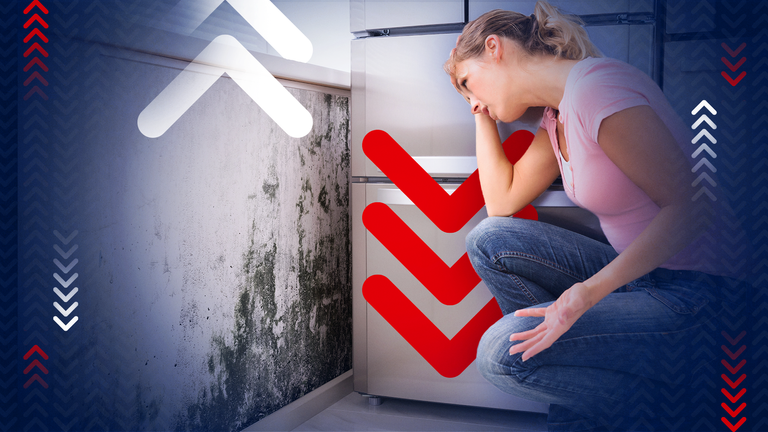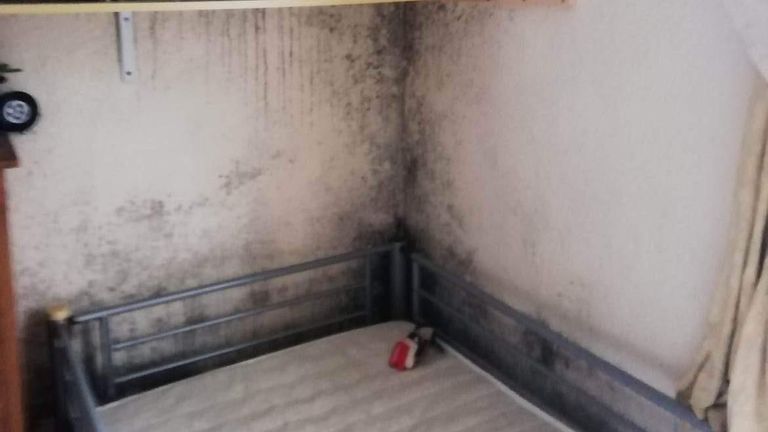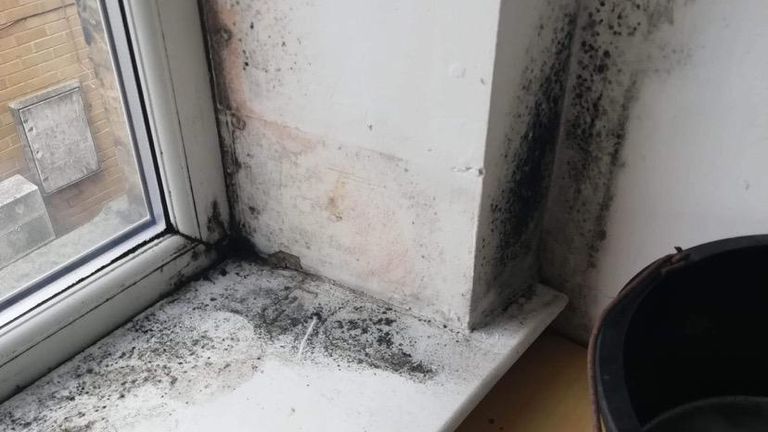England's ageing housing stock poses 'massive health risk' in cost of living crisis
Experts warn that cold, damp and mould pose a "massive health problem" this winter as people cannot afford to heat their homes. New data from the government and the social housing watchdog shows that conditions are already deteriorating for private and social tenants.
Sunday 18 December 2022 06:54, UK
Experts are warning of the "massive health problem" that could result from England's ageing housing stock in the cost of living crisis.
It's something that Peter, who rents a home in Yorkshire for him and his two sons, knows all too well.
There have been ongoing issues with damp and mould for the whole decade that he's lived there and it's negatively affecting the family's physical and mental health.
"I'm poorly already and it's just so cold in winter. It's a dump, really. [The boys] get more coughs and colds," he says.
"[They're] not sleeping properly. At the moment we're sleeping three in a room just to keep warm."
Rising energy costs mean that many people are turning down their thermostats, exposing them to mould and damp and putting them at risk of respiratory and circulatory issues.
The regulator recently found that there were "significant failings" by the housing association responsible for the home where two-year-old Awaab Ishak died because of mould.
Exclusive numbers from the social housing watchdog shared with Sky News paint a worrying picture for the sector.
In the eight months to November, there have been 30% more complaints and twice as many decisions following investigations into damp, mould and leaks in social housing as there were in 2020-21, according to the Housing Ombudsman.
Last year was a record high, but if the current trend continues, this year is on track to surpass those numbers.
Chris Johnes, public health speciality registrar at The Health Foundation, says that the cost of living crisis poses a "massive heath problem" this winter, as many people cannot afford to heat their homes adequately.
"If you drop much below 18 degrees in the home for significant periods, which is what is recommended by the World Health Organisation, you're going to see significant health impacts, especially for people with pre-existing conditions," he says.
Mould and damp can have devastating health impacts, but are not the only issues.
Mr Johnes says that decreasing the temperature of your home even a couple of degrees below 18 significantly increases the likelihood of respiratory and circulatory problems.
The risks are especially high for children. They are twice as likely to suffer respiratory problems after long periods in cold, damp homes, according to a report from the Institute of Health Inequality.
The biggest issues are in private rentals
Conditions in many social homes are concerning, but the most acute issues are actually in private rented homes.
More than one in 10 private rentals have issues with damp and almost a quarter don't meet the government's Decent Homes Standard, according to new data from the English Housing Survey 2021-22.
This is a much higher proportion than all other types of tenure.
Moreover, the scale of the problem has increased over the past year in the private rented sector, while it has continued to improve in all other tenures.
In some parts of the country conditions are even worse.
Almost one in six private rentals in Yorkshire and the Humber have issues with damp, according to the most recent data on regional differences from 2020-21.
Almost two-fifths are non-decent, which is three times as many as in the South East.
As well as having a devastating personal impact, poor housing is a huge drain on public services.
The National Audit Office estimates that poor-quality housing in the private rented sector costs the NHS around £340m a year.
At his home in Yorkshire, Peter worries about how much worse things will get over the cold winter months.
"Every winter there is damp, leaks from the shower, leaks from the boys' bedroom," he says.
"After Christmas when the snow comes and the rain and the wind, then you can feel the wet through the walls.
"I feel we've got no choice whatsoever. I think if I approach him [the landlord] too much he'll throw us out and just get someone else in. It's just a nightmare, a complete nightmare."
We have changed Peter's name as he wants to remain anonymous for fear that he will be evicted for speaking out.
UK has oldest housing stock in Europe
A lack of new homes means that the housing stock relies on Victorian and early 20th century houses, which tend to be poorly insulated and costly to retrofit.
More than a third of homes in England were built before 1945, including a fifth before 1919.
The private rental sector has an even higher proportion of older homes. Almost a third were built pre-1919.
Professor David Robinson, head of the urban studies and planning department at the University of Sheffield, says that the UK's old housing stock is a legacy of its early industrialisation.
"A huge amount of housing was put up during the rapid growth of industrial cities in the 1800s and a lot of that is terraced housing, which is very hard to retrofit."
This is especially true in Yorkshire and other parts of the north and Midlands.
"There are higher levels of old stock, more terraced housing, and less new housing development," says Prof Robinson.
"Policy views it as the individual owner's responsibility to maintain their property, but as a society we need to make sure that the housing stock is maintained if we are going to be able to house future generations."
A spokesperson for the Department for Levelling Up, Housing and Communities said: "We are introducing a Decent Homes Standard for the Private Rented Sector for the first time ever which will make sure privately rented homes are safe and decent. We have recently consulted on this and will set out next steps in due course.
"Under the Decent Homes Standard, providers of social housing must take action if hazardous levels of damp and mould are found in properties.
"We're also strengthening the powers of the Regulator of Social Housing to make sure landlords meet these standards and do not ignore tenants, including issuing unlimited fines and making emergency repairs with landlords footing the bill."
The Data and Forensics team is a multi-skilled unit dedicated to providing transparent journalism from Sky News. We gather, analyse and visualise data to tell data-driven stories. We combine traditional reporting skills with advanced analysis of satellite images, social media and other open source information. Through multimedia storytelling we aim to better explain the world while also showing how our journalism is done.



